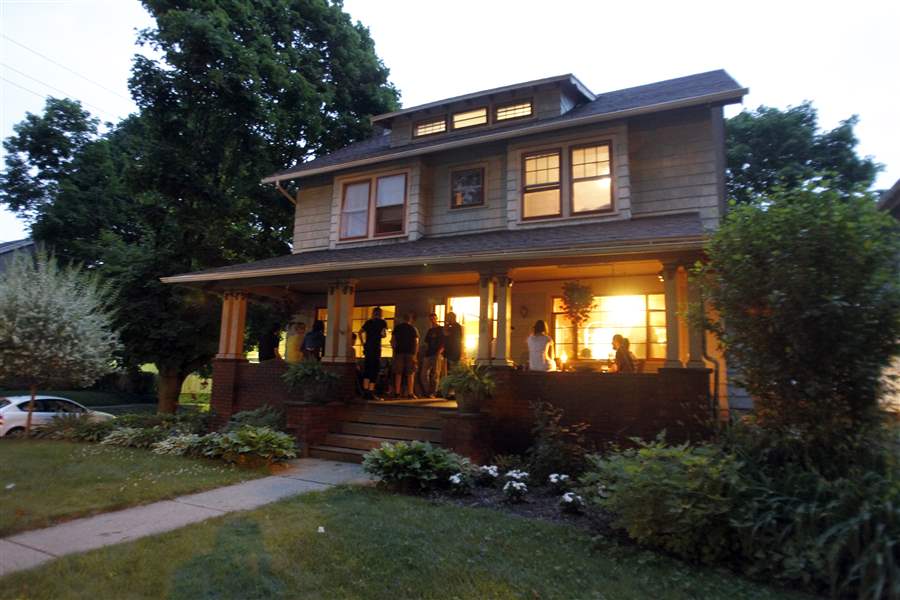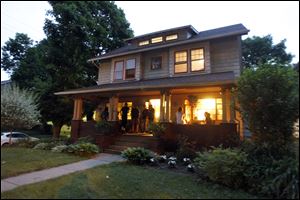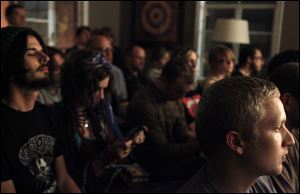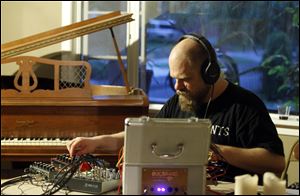
House offers a home to avant-garde music
7/3/2011
Patrons hang out on the porch of the Robinwood Concert House in the historical Old West End in Toledo.
The Blade/Andy Morrison
Buy This Image

Patrons hang out on the porch of the Robinwood Concert House in the historical Old West End in Toledo.
Nestled in a cozy, tree-lined neighborhood street in the Old West End, the Robinwood Concert House isn’t what you’d expect in a concert venue.
Then again, this performance space isn’t for typical artists either.
Named for the street it occupies, the two-story Robinwood Concert House is owned and operated by Gabe Beam, a 36-year-old record store employee with a taste for the extremes in music and who has lived in the home at 2564 Robinwood Ave. for six years.
That appreciation for the avant-garde spilled over into his personal space in October, 2008, after he opened the four-bedroom home to like-minded music fans and musicians for monthly concerts.
The venue is a large rectangular living room doubling as a do-it-yourself music scene. On one end of the room are rows of chairs stacked for the audience, while the other side of the room is the performance area.
That’s it.
Simple. Minimal. Intimate. Much like the music itself.
This isn’t a place for a bar band cranking out a collection of well-worn cover tunes. The Robinwood Concert House has become an unlikely on-the-road destination for a disparate genre of performers who share a common thread of existing on the periphery of music’s radar, such as Basshaters, a San Francisco duo playing improvised electro-acoustic music.
The pair played a recent gig on a pleasant Thursday evening at the Robinwood, with a "stage" consisting of a fold-out table covered with electronic noise-making gadgets and two chairs.
The atmosphere was appropriately stark, with the only light coming from two candles near the performers, who scratched and banged on cymbals to generate electronic noise that would blend in well with a 1950s sci-fi film featuring UFOs and laser beams.

The audience fills the large rectangular living room of Gabe Beam’s concert house.
The audience of a dozen people was quiet and respectful of the musicians: Jacob Felix Heule on cymbals and machines, and Tony Dryer, manning the bulk of the electro-devices.
There was no melody or hook in the music they were making; each performance piece was a minimalist cacophony of improvised metallic scratches, hums, and whirs tied together — loosely — by virtue of having a standard beginning, middle, and end.
This was out-there music. And to many raised on mainstream radio, what the Basshaters were doing would be considered a whole lot of noise, perhaps a step or two above the sound pollution of a construction site.
"The stuff we’re doing is super noncommercial," Heule said. "So it’s got to be a noncommercial venue, which means an art gallery or a place like this. That covers all the places we’re playing on this tour."
Beam knows there aren’t many in northwest Ohio who would seek out a performance by artists such as Basshaters, much less share his love of music that defies popular definitions, which, as he describes, is "basically anything that’s … hard to throw a bar code on."
But for those few — and for those looking to challenge their musical tastes — he’s brought to Toledo artists ranging from jazz improvisation quartets to singer-songwriters using tapes of found sounds, as well as this night’s opening performer, Beau Finley, an attorney with the Federal Communications Commission who plays ambient, improvised experimental music in his spare time.
"There’s people here that are eager to hear something new or something that they’re just curious about that’s unfolding right before their eyes," Beam said. "[But] this stuff doesn’t work at a bar or any other place with all the distractions … I’ve tried it before. TVs and a busy bar and all these people, all these distractions can get in the way."
House shows are not new, and certainly not unique to Toledo.
Beam first learned about them while searching for places through the Midwest for his band, KBD, to perform. An acronym for the last names of its three members, KBD is a free-form improvisational trio consisting of drums and percussion, guitar, and electronics.
"It’s underground and not very accessible music," Beam said, "if it even is music at that point."
Since playing the normal bar-club circuit wouldn’t work for KBD and its limited appeal, house shows — literally performing in people’s homes — were a great alternative. Owners weren’t worried about making money, and bands appreciated the fact that those who came to the gigs were there for the music and not the social scene.
Beam wondered if he could bring the same to Toledo.
Nearly three years ago a friend in Columbus contacted him about opening his home to avant-garde German piano player Simone Weisenfels, who was on tour with multiinstrumentalist Adam Smith from Columbus.
Beam liked the idea. He measured his living room to see if he could host a show, bought some chairs, and the Robinwood Concert House was born.
Then he began to reach out to off-the-grid bands on message boards devoted to experimental music, with the guarantee of "food, a cozy place to stay, donations, and an audience that listens."

Jason Soliday of Chicago is one of many avant-garde musicians who perform at the house.
His plan was "connecting the dots" of tour dates through the Midwest, so that an artist playing in Cleveland one night could stop off at the Robinwood Concert House the following night — perform, sleep, and even shower — and hit the road for a show in Detroit or Chicago.
He typically books one act a week year-round, and has hosted concerts with audiences from as many as 60 to as few as six.
Beam keeps Robinwood Concert House patrons updated on upcoming shows through a Web site, http://toledobellows.wordpress.com. Word of mouth among friends helps his cause as well.
Finley learned about the Toledo venue from a friend, who told him, "I had a really great set there and you’re touring, so why not?" so he contacted Beam.
"House shows are actually the most fun to play," Finley said. "They’re more relaxed. You can set up a half-hour before you play. Gabe cooked us dinner and it was delicious. You don’t get that at a bar."
Added Heule: "People playing this sort of music, when they ask me, this is definitely the spot to go to because it’s a great experience here."
It’s not just the performers who are appreciative of what Beam is doing.
"Robinwood is great because there’s nowhere else in town I know of where you can go to see this kind of music," said Yvonne Martinez, 28, from Toledo, who has been attending shows at the house for a year after learning about the venue through friends.
"When the band is on, people are paying attention, because that’s why we’re all here, to see these experimental kind of genres. There’s nowhere else to go, and if this place wasn’t here we wouldn’t have access to that."
The Robinwood Concert House is gaining attention in the national alternative music scene as well as word about the venue spreads.
"Look at the tour dates for a lot of groups [performing at Robinwood] and Toledo sticks out like a sore thumb," said James Kantner, a 38-year-old neighbor of Beam’s, who regularly attends shows. "… It’s a lot of major cities and then Toledo is right in the middle of it, which is cool to see.
"A lot of times it kind of shames me," he added. "There’s a guy playing both coasts and Toledo, so I should probably go check it out."
For Beam, this is a way to give back to the community and, he hopes, to build a musical/artistic cultural base. It does come with a price. He pays for the food to feed the musicians himself, and doesn’t charge a cover at the door. Instead, there is a collection jar for audience members to tip the musicians.
In other words, Beam loses money on every show.
"There’s no financial gain at all. It’s more or less something I’ve got to do, otherwise I’d go to a bar and spend $30 or $40 and go see a show. I’d rather keep it in-house and put my money where I can actually feel like it’s breeding something.
"It’s a slow go," he added, "but there’s a lot of new faces that come out."
Contact Kirk Baird at kbaird@theblade.com or 419-724-6734.